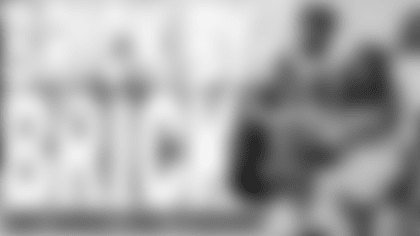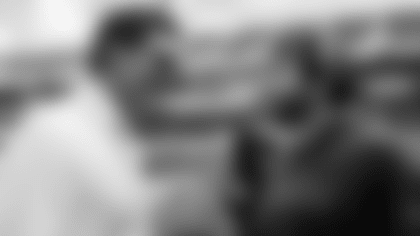Mental health – it's a once-taboo topic that is now at the forefront of conversation around the globe. In recent years, the NFL has advocated to de-stigmatize mental health by investing in an initiative to prevent potential tragedies. The phrase "mental health" can engender a negative connotation, conjuring up thoughts of self-harm, depression, and anxiety. Not everyone has dealt with those issues but everyone has mental health. The mind, like anything else, is a muscle that must be trained and prioritized.
There has been a longstanding misconception regarding pro athletes that because of their physical endurance, and the platform they have, that they cannot show emotion. Consequently, their lives are often perceived as 'easy' by a vast majority. However, that narrative could not be further from the truth. It not only belittles and prejudges NFL players but fails to convey the importance of mental health. Mental illness does not discriminate and possesses the capability of destroying its victims if not treated. Success is not immune to depression. Every person regardless of occupation, deals with trauma in some sense and fights an unseen battle.
For Buccaneers' cornerback Jamel Dean, he remembers the lowest point in his life all too well. As the Super Bowl champion sat down in a brightly lit room that captures the essence of his newfound mindset after voluntary OTAs practice, Dean recalled his rock bottom moment.
"Back in my first two years of college, that was probably the darkest days of my life," Dean described. "I had two surgeries going into college, went to Ohio State and they told me that there was no hope for my football career because of how my knees are set up. Hearing that at a young age, I thought, 'This is it?' I had plans of playing football. That was my dream to play college football and then when I step foot on campus, that happened. Then I go through the transfer process, and I get to Auburn that same year. I had to sit out that year and just watch my teammates play and enjoy time on the football field. Then, going into my redshirt sophomore year, everything was going good, and I finally got the opportunity. I was excited and then I tear my other ACL."
In 2014, Dean tore the ACL in his right knee and recovered fully to play his senior year at Cocoa High School in Florida. In the final playoff game that season, he re-injured the same knee (torn meniscus) and flew the next day to Ohio State for a campus visit as he prepared to enroll in January 2015. As instructed, Dean underwent surgery over Christmas break believing the worst would be behind him. However, nothing could have prepared him for the news he would receive next. Less than a week into classes at Ohio State, he was medically disqualified by trainers and told he would not play for the Buckeyes. They believed his knee would not recover to allow performance. In one instant as the words permeated, Dean felt his dreams of playing college football and eventually donning an NFL jersey were shattered. Reality sunk in.
At 18-years-old, he decided to get a second opinion. Dean went to be evaluated by esteemed orthopedic sports surgeon Dr. James Andrews, who after thorough evaluation concluded that Dean could return healthy that fall after continued rehabilitation. Ohio State would not adjust their original diagnosis, so Dean bet on himself. Despite their definitive resolve, Dean continued his self-motivated path to the gridiron. He transferred to Auburn, where the new defensive coordinator, Will Muschamp, had previously recruited Dean while he was the head coach at Florida. He was not allowed to immediately play after the NCAA denied a waiver. After being told he would never play football again, Dean now had to watch from the sidelines during the 2015 season, but the obstacles were far from over.
View the top photos of cornerback Jamel Dean.

TAMPA, FL - JULY 08, 2019 - Cornerback Jamel Dean #35 of the Tampa Bay Buccaneers signs his rookie contract at AdventHealth Training Center in Tampa, Florida. Photo By Kyle Zedaker/Tampa Bay Buccaneers

TAMPA, FL - AUGUST 16, 2019 - Cornerback Jamel Dean #35 of the Tampa Bay Buccaneers during the preseason game between the Miami Dolphins and the Tampa Bay Buccaneers at Raymond James Stadium. The Buccaneers won the game, 16-14. Photo By Tori Richman/Tampa Bay Buccaneers

JACKSONVILLE, FL - DECEMBER 01, 2019 - Cornerback Jamel Dean #35 of the Tampa Bay Buccaneers before the game between the Tampa Bay Buccaneers and Jacksonville Jaguars at TIAA Bank Field. The Buccaneers won the game, 28-11. Photo By Kyle Zedaker/Tampa Bay Buccaneers

TAMPA, FL - NOVEMBER 30, 2019 - Cornerback Jamel Dean #35 of the Tampa Bay Buccaneers as the Buccaneers depart for the game between the Tampa Bay Buccaneers and Jacksonville Jaguars at TIAA Bank Field. Photo By Kyle Zedaker/Tampa Bay Buccaneers

TAMPA, FL - DECEMBER 08, 2019 - Cornerback Jamel Dean #35 of the Tampa Bay Buccaneers during the game between the Indianapolis Colts and Tampa Bay Buccaneers at Raymond James Stadium. The Buccaneers won the game, 38-35. Photo By Kyle Zedaker/Tampa Bay Buccaneers

TAMPA, FL - DECEMBER 14, 2019 - Cornerback Jamel Dean #35 of the Tampa Bay Buccaneers departs before the game during the game between the Tampa Bay Buccaneers and Detroit Lions. Photo By Kyle Zedaker/Tampa Bay Buccaneers

DETROIT, MI - DECEMBER 15, 2019 - Cornerback Jamel Dean #35 of the Tampa Bay Buccaneers during the game between the Tampa Bay Buccaneers and Detroit Lions at Ford Field. The Buccaneers won the game, 38-17. Photo By Kyle Zedaker/Tampa Bay Buccaneers

TAMPA, FL- DECEMBER 18, 2019 - Cornerback Jamel Dean #35 of the Tampa Bay Buccaneers during practice at AdventHealth Training Center indoor facility. Photo By Kyle Zedaker/Tampa Bay Buccaneers

NEW ORLEANS, LA - SEPTEMBER 13, 2020 - Cornerback Jamel Dean #35 of the Tampa Bay Buccaneers during the game between the Tampa Bay Buccaneers and New Orleans Saints at Mercedes Benz Superdome. The Buccaneers lost the game, 34-23. Photo By Kyle Zedaker/Tampa Bay Buccaneers

TAMPA, FL- SEPTEMBER 16, 2020 - Cornerback Jamel Dean #35 of the Tampa Bay Buccaneers wears a 'BLACK LIVES MATTER' decal during practice at AdventHealth Training Center. Photo By Kyle Zedaker/Tampa Bay Buccaneers

TAMPA, FL - SEPTEMBER 20, 2020 - Cornerback Jamel Dean #35 of the Tampa Bay Buccaneers during the game between the Carolina Panthers and Tampa Bay Buccaneers at Raymond James Stadium. The Buccaneers won the game, 31-17. Photo By Kyle Zedaker/Tampa Bay Buccaneers

TAMPA, FL - OCTOBER 04, 2020 - Cornerback Jamel Dean #35 of the Tampa Bay Buccaneers after the game between the Los Angeles Chargers and Tampa Bay Buccaneers at Raymond James Stadium. The Buccaneers won the game, 38-31. Photo By Kyle Zedaker/Tampa Bay Buccaneers

TAMPA, FL - OCTOBER 04, 2020 - Cornerback Jamel Dean #35 of the Tampa Bay Buccaneers during the game between the Los Angeles Chargers and Tampa Bay Buccaneers at Raymond James Stadium. The Buccaneers won the game, 38-31. Photo By Tori Richman/Tampa Bay Buccaneers

TAMPA, FL - OCTOBER 18, 2020 - Outside Linebacker Shaquil Barrett #58, Safety Jordan Whitehead #33, Safety Mike Edwards #32, Cornerback Sean Murphy-Bunting #23, Cornerback Jamel Dean #35, Inside Linebacker Devin White #45, and Cornerback Carlton Davis #24 of the Tampa Bay Buccaneers celebrate an interception returned for a touchdown during the game between the Green Bay Packers and Tampa Bay Buccaneers at Raymond James Stadium. The Buccaneers won the game, 38-10. Photo By Kyle Zedaker/Tampa Bay Buccaneers

TAMPA, FL - OCTOBER 18, 2020 - Cornerback Jamel Dean #35 of the Tampa Bay Buccaneers after the game between the Green Bay Packers and Tampa Bay Buccaneers at Raymond James Stadium. The Buccaneers won the game, 38-10. Photo By Kyle Zedaker/Tampa Bay Buccaneers

TAMPA, FL - OCTOBER 18, 2020 - Cornerback Jamel Dean #35 of the Tampa Bay Buccaneers returns an interception for a touchdown during the game between the Green Bay Packers and Tampa Bay Buccaneers at Raymond James Stadium. The Buccaneers won the game, 38-10. Photo By Matt May/Tampa Bay Buccaneers
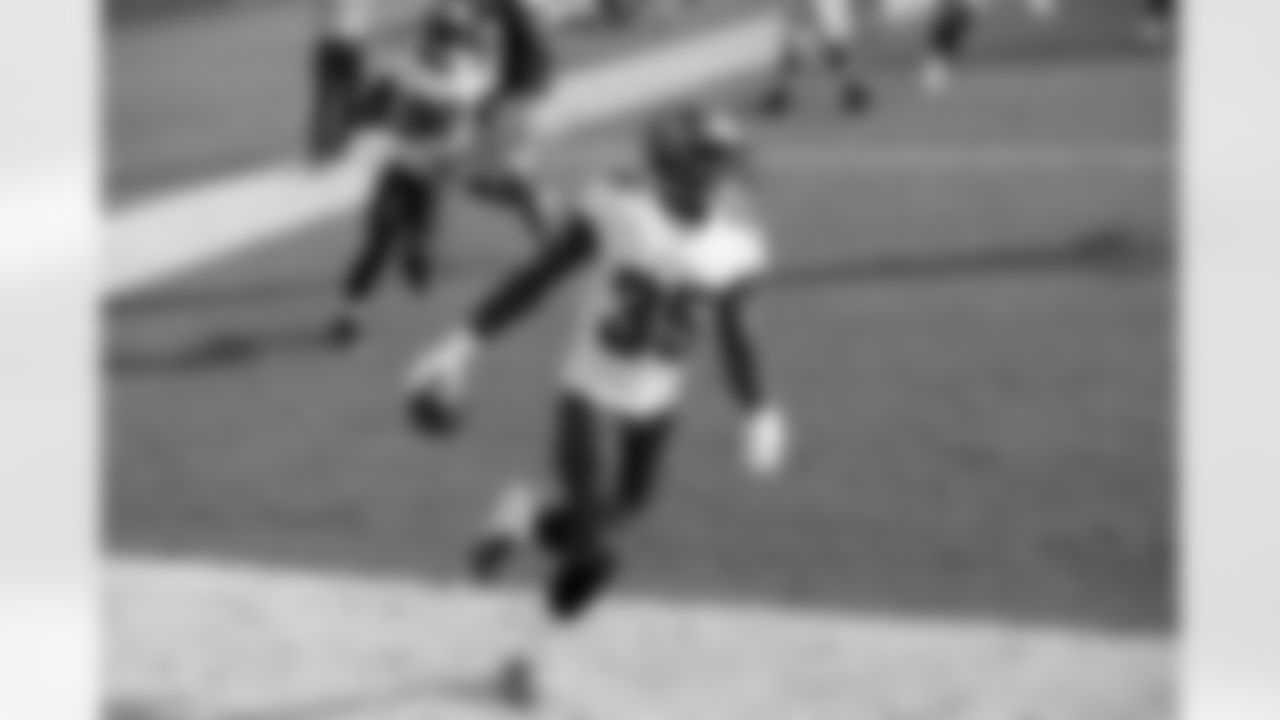
TAMPA, FL - OCTOBER 18, 2020 - Cornerback Jamel Dean #35 of the Tampa Bay Buccaneers during the game between the Green Bay Packers and Tampa Bay Buccaneers at Raymond James Stadium. The Buccaneers won the game, 38-10. Photo By Matt May/Tampa Bay Buccaneers

TAMPA, FL - OCTOBER 22, 2020 - Cornerback Jamel Dean #35 of the Tampa Bay Buccaneers during practice at AdventHealth Training Center. Photo By Kyle Zedaker/Tampa Bay Buccaneers

TAMPA, FL - OCTOBER 25, 2020 - Cornerback Jamel Dean #35 of the Tampa Bay Buccaneers during the game between the Tampa Bay Buccaneers and Las Vegas Raiders at Allegiant Stadium. The Buccaneers won the game 45-20. Photo By Kyle Zedaker/Tampa Bay Buccaneers

TAMPA, FL - NOVEMBER 08, 2020 - Cornerback Jamel Dean #35 of the Tampa Bay Buccaneers before the game between the New Orleans Saints and Tampa Bay Buccaneers at Raymond James Stadium. The Buccaneers lost the game, 38-3. Photo By Kyle Zedaker/Tampa Bay Buccaneers
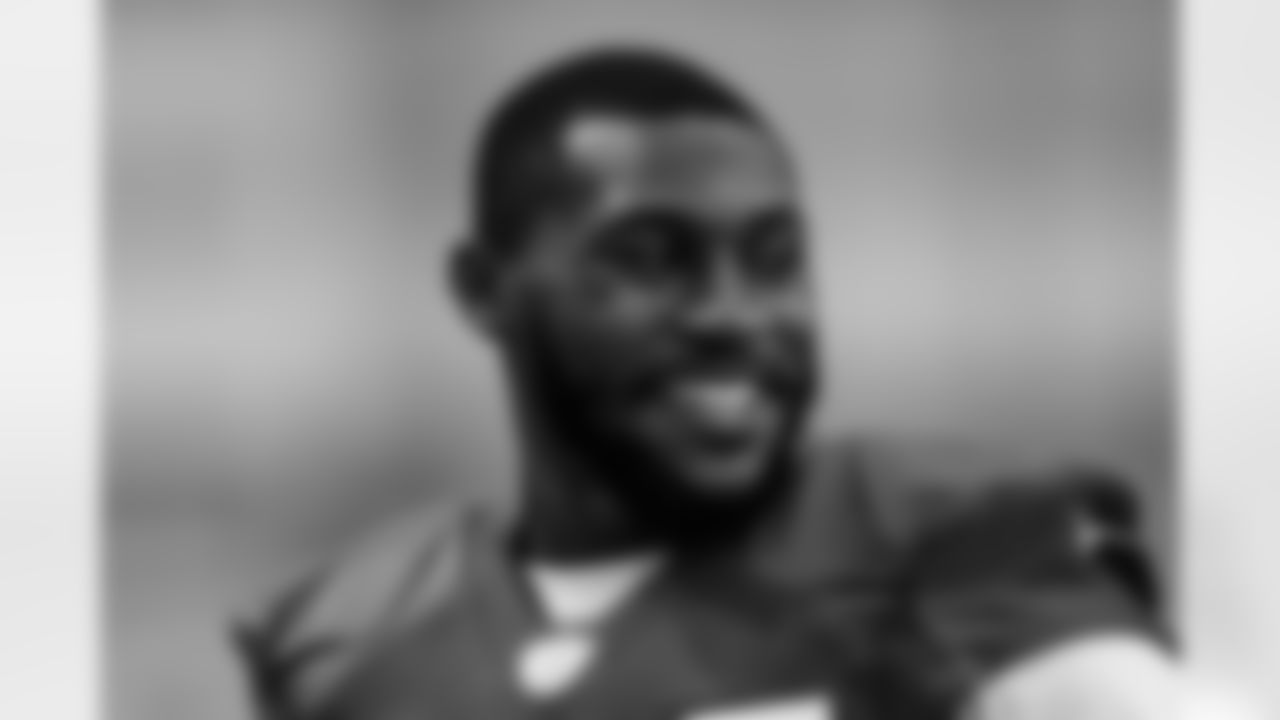
TAMPA, FL - NOVEMBER 11, 2020 - Cornerback Jamel Dean #35 of the Tampa Bay Buccaneers during practice at AdventHealth Training Center. Photo By Kyle Zedaker/Tampa Bay Buccaneers

CHARLOTTE, NC - NOVEMBER 15, 2020 - Cornerback Jamel Dean #35 of the Tampa Bay Buccaneers before the game between the Tampa Bay Buccaneers and Carolina Panthers at Bank of America Stadium. The Buccaneers won the game, 46-23. Photo By Kyle Zedaker/Tampa Bay Buccaneers

TAMPA, FL - DECEMBER 24, 2020 - Cornerback Jamel Dean #35 of the Tampa Bay Buccaneers during practice at AdventHealth Training Center. Photo By Kyle Zedaker/Tampa Bay Buccaneers

TAMPA, FL - DECEMBER 30, 2020 - Cornerback Jamel Dean #35 of the Tampa Bay Buccaneers during practice at AdventHealth Training Center. Photo By Kyle Zedaker/Tampa Bay Buccaneers

TAMPA, FL - JANUARY 03, 2021 - Cornerback Jamel Dean #35 of the Tampa Bay Buccaneers before the game between the Atlanta Falcons and Tampa Bay Buccaneers at Raymond James Stadium. The Buccaneers won the game, 44-27. Photo By Kyle Zedaker/Tampa Bay Buccaneers

TAMPA, FL - JANUARY 03, 2021 - Cornerback Jamel Dean #35 of the Tampa Bay Buccaneers before the game between the Atlanta Falcons and Tampa Bay Buccaneers at Raymond James Stadium. The Buccaneers won the game, 44-27. Photo By Kyle Zedaker/Tampa Bay Buccaneers

GREEN BAY, WI - JANUARY 24, 2021 - Cornerback Jamel Dean #35 of the Tampa Bay Buccaneers before the NFC Championship game between the Tampa Bay Buccaneers and Green Bay Packers at Lambeau Field. The Buccaneers won the game 31-26. Photo By Kyle Zedaker/Tampa Bay Buccaneers
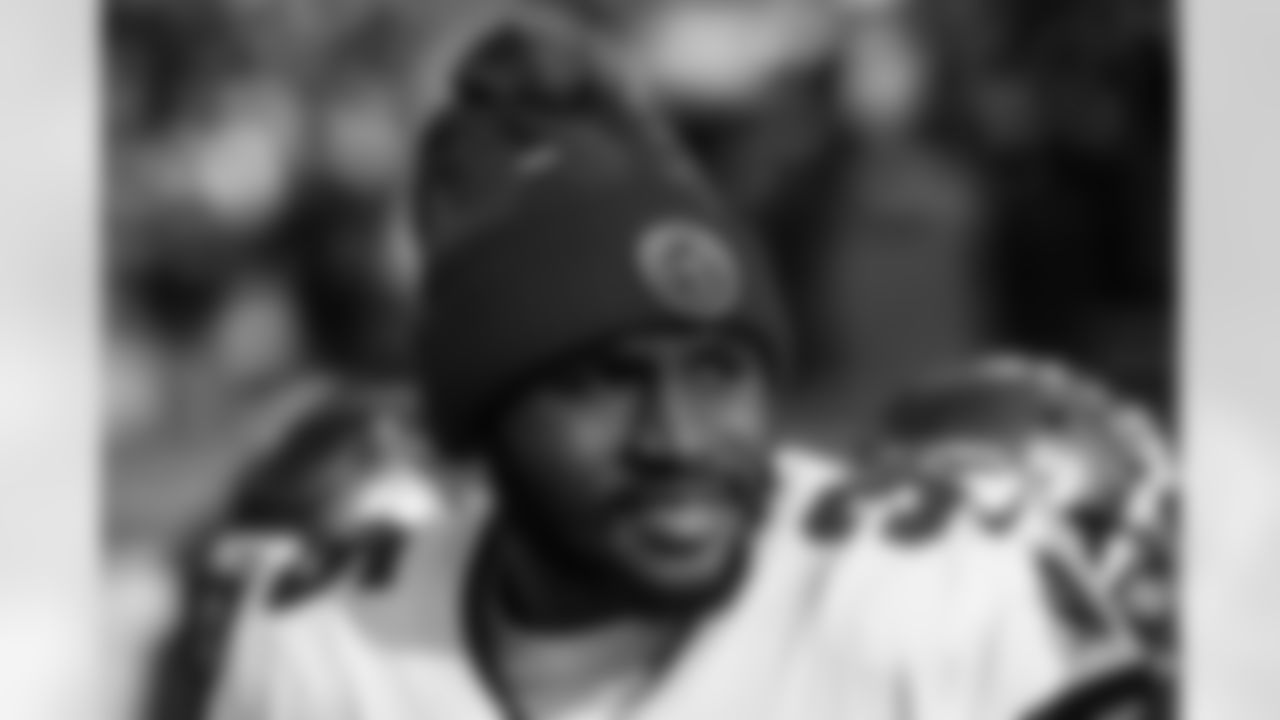
GREEN BAY, WI - JANUARY 24, 2021 - Cornerback Jamel Dean #35 of the Tampa Bay Buccaneers before the NFC Championship game between the Tampa Bay Buccaneers and Green Bay Packers at Lambeau Field. The Buccaneers won the game 31-26. Photo By Kyle Zedaker/Tampa Bay Buccaneers

GREEN BAY, WI - JANUARY 24, 2021 - Cornerback Jamel Dean #35 of the Tampa Bay Buccaneers during the NFC Championship game between the Tampa Bay Buccaneers and Green Bay Packers at Lambeau Field. The Buccaneers won the game 31-26. Photo By Kyle Zedaker/Tampa Bay Buccaneers

TAMPA, FL - February 07, 2021 - Cornerback Carlton Davis #24 and Cornerback Jamel Dean #35 of the Tampa Bay Buccaneers celebrate after Super Bowl LV between the Kansas City Chiefs and Tampa Bay Buccanerers at Raymond James Stadium. The Buccaneers won the game, 31-9. Photo By Kyle Zedaker/Tampa Bay Buccaneers

TAMPA, FL - FEBRUARY 10, 2021 - Cornerback Jamel Dean #35 of the Tampa Bay Buccaneers during the Super Bowl LV victory boat parade. Photo By Tori Richman/Tampa Bay Buccaneers

TAMPA, FL - July 27, 2021 - Cornerback Jamel Dean #35 of the Tampa Bay Buccaneers during 2021 Training Camp practice at AdventHealth Training Center. Photo By Kyle Zedaker/Tampa Bay Buccaneers

TAMPA, FL - August 07, 2021 - Cornerback Jamel Dean #35 of the Tampa Bay Buccaneers during 2021 Training Camp practice at AdventHealth Training Center. Photo By Kyle Zedaker/Tampa Bay Buccaneers

TAMPA, FL - August 11, 2021 - Cornerback Jamel Dean #35 of the Tampa Bay Buccaneers during 2021 Training Camp practice at AdventHealth Training Center. Photo By Kyle Zedaker/Tampa Bay Buccaneers

TAMPA, FL - August 14, 2021 - Cornerback Carlton Davis #24 and Cornerback Jamel Dean #35 of the Tampa Bay Buccaneers before the preseason game between the Cincinnati Bengals and Tampa Bay Buccaneers at Raymond James Stadium. The Bengals won the game, 19-14. Photo By Kyle Zedaker/Tampa Bay Buccaneers

TAMPA, FL - AUGUST 17, 2021 - Cornerback Jamel Dean #35 of the Tampa Bay Buccaneers during 2021 Training Camp practice at AdventHealth Training Center. Photo By Tori Richman/Tampa Bay Buccaneers

TAMPA, FL - September 15, 2021 - Cornerback Jamel Dean #35 of the Tampa Bay Buccaneers during practice at AdventHealth Training Center. Photo By Kyle Zedaker/Tampa Bay Buccaneers

TAMPA, FL - September 19, 2021 - Cornerback Jamel Dean #35 of the Tampa Bay Buccaneers during the game between the Atlanta Falcons and Tampa Bay Buccaneers at Raymond James Stadium. The Buccaneers won the game, 48-25. Photo By Kyle Zedaker/Tampa Bay Buccaneers

TAMPA, FL - September 25, 2021 - Cornerback Jamel Dean #35 of the Tampa Bay Buccaneers departs for the game between the Tampa Bay Buccaneers and Los Angeles Rams at SoFi Stadium. Photo By Kyle Zedaker/Tampa Bay Buccaneers

TAMPA, FL - October 10, 2021 - Cornerback Jamel Dean #35 of the Tampa Bay Buccaneers intercepts a pass during the game between the Miami Dolphins and Tampa Bay Buccaneers at Raymond James Stadium. The Buccaneers won the game, 45-17. Photo By Mike Carlson/Tampa Bay Buccaneers

TAMPA, FL - October 10, 2021 - Cornerback Jamel Dean #35 of the Tampa Bay Buccaneers intercepts a pass during the game between the Miami Dolphins and Tampa Bay Buccaneers at Raymond James Stadium. The Buccaneers won the game, 45-17. Photo By Matt May/Tampa Bay Buccaneers

TAMPA, FL - October 10, 2021 - Cornerback Jamel Dean #35 of the Tampa Bay Buccaneers before the game between the Miami Dolphins and Tampa Bay Buccaneers at Raymond James Stadium. The Buccaneers won the game, 45-17. Photo By Matt May/Tampa Bay Buccaneers

TAMPA, FL - OCTOBER 10, 2021 - Cornerback Jamel Dean #35 of the Tampa Bay Buccaneers during the game between the Miami Dolphins and Tampa Bay Buccaneers at Raymond James Stadium. The Buccaneers won the game, 45-17. Photo By Tori Richman/Tampa Bay Buccaneers

TAMPA, FL - OCTOBER 10, 2021 - Cornerback Jamel Dean #35 of the Tampa Bay Buccaneers during the game between the Miami Dolphins and Tampa Bay Buccaneers at Raymond James Stadium. The Buccaneers won the game, 45-17. Photo By Tori Richman/Tampa Bay Buccaneers

TAMPA, FL - OCTOBER 10, 2021 - Cornerback Jamel Dean #35 of the Tampa Bay Buccaneers before the game between the Miami Dolphins and Tampa Bay Buccaneers at Raymond James Stadium. The Buccaneers won the game, 45-17. Photo By Tori Richman/Tampa Bay Buccaneers

TAMPA, FL - October 12, 2021 - Cornerback Jamel Dean #35 of the Tampa Bay Buccaneers during practice at AdventHealth Training Center. Photo By Kyle Zedaker/Tampa Bay Buccaneers

TAMPA, FL - October 24, 2021 - Cornerback Jamel Dean #35 and Inside Linebacker Devin White #45 of the Tampa Bay Buccaneers during the game between the Chicago Bears and Tampa Bay Buccaneers at Raymond James Stadium. The Buccaneers won the game, 38-3. Photo By Kyle Zedaker/Tampa Bay Buccaneers

TAMPA, FL - OCTOBER 24, 2021 - Cornerback Jamel Dean #35 of the Tampa Bay Buccaneers during the game between the Chicago Bears and Tampa Bay Buccaneers at Raymond James Stadium. The Buccaneers won the game, 38-3. Photo By Tori Richman/Tampa Bay Buccaneers
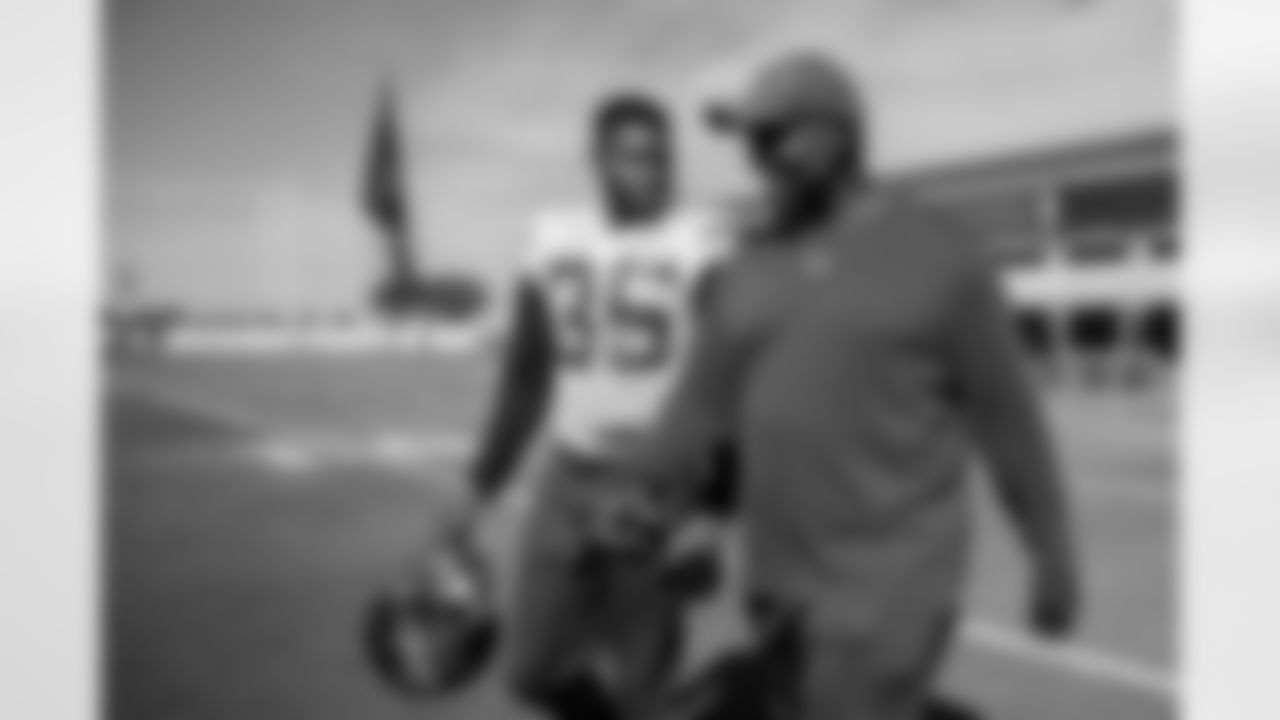
TAMPA, FL - October 27, 2021 - Cornerback Jamel Dean #35 and Defensive Coordinator Todd Bowles of the Tampa Bay Buccaneers during practice at AdventHealth Training Center. Photo By Kyle Zedaker/Tampa Bay Buccaneers

NEW ORLEANS, LA - October 31, 2021 - Cornerback Jamel Dean #35 of the Tampa Bay Buccaneers before the game between the Tampa Bay Buccaneers and New Orleans Saints at Caesars Superdome. The Saints won the game, 36-27. Photo By Kyle Zedaker/Tampa Bay Buccaneers

TAMPA, FL - November 24, 2021 - Cornerback Jamel Dean #35 and Defensive Coordinator Todd Bowles of the Tampa Bay Buccaneers during practice at AdventHealth Training Center. Photo By Kyle Zedaker/Tampa Bay Buccaneers
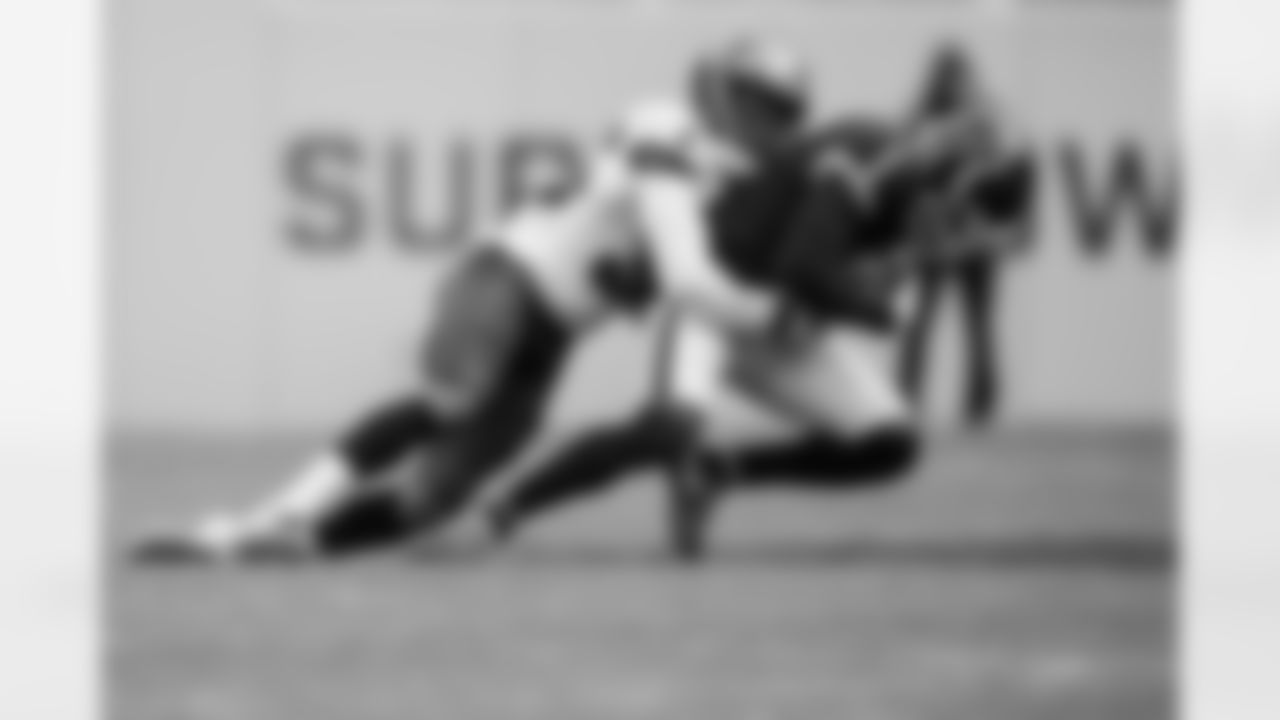
LANDOVER, MD - NOVEMBER 14, 2021 - Cornerback Jamel Dean #35 of the Tampa Bay Buccaneers during the game between the Tampa Bay Buccaneers and Washington Football Team at Fedex Field. The Buccaneers lost the game 29-19. Photo By Tori Richman/Tampa Bay Buccaneers

TAMPA, FL - November 22, 2021 - Cornerback Jamel Dean #35 of the Tampa Bay Buccaneers during the game between the New York Giants and Tampa Bay Buccaneers at Raymond James Stadium. The Buccaneers won the game, 30-10. Photo By Kyle Zedaker/Tampa Bay Buccaneers

ATLANTA, GA - December 05, 2021 - Cornerback Jamel Dean #35 of the Tampa Bay Buccaneers before the game between the Tampa Bay Buccaneers and Atlanta Falcons at Mercedes-Benz Stadium The Buccaneers won the game, 30-17. Photo By Kyle Zedaker/Tampa Bay Buccaneers

ATLANTA, GA - December 05, 2021 - Cornerback Jamel Dean #35 of the Tampa Bay Buccaneers during the game between the Tampa Bay Buccaneers and Atlanta Falcons at Mercedes-Benz Stadium The Buccaneers won the game, 30-17. Photo By Kyle Zedaker/Tampa Bay Buccaneers
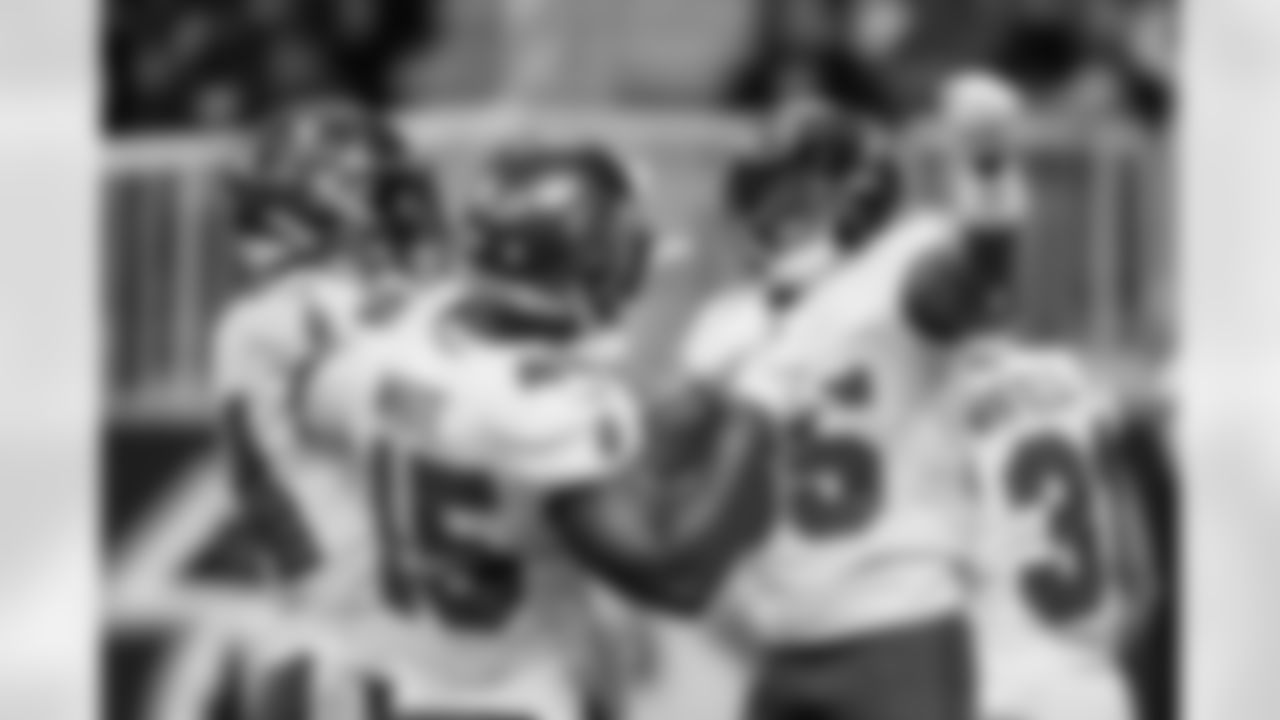
ATLANTA, GA - December 05, 2021 - Inside Linebacker Lavonte David #54 and Inside Linebacker Devin White #45 of the Tampa Bay Buccaneers celebrate with Cornerback Jamel Dean #35 of the Tampa Bay Buccaneers during the game between the Tampa Bay Buccaneers and Atlanta Falcons at Mercedes-Benz Stadium The Buccaneers won the game, 30-17. Photo By Kyle Zedaker/Tampa Bay Buccaneers

ATLANTA, GA - DECEMBER 05, 2021 - Cornerback Jamel Dean #35 of the Tampa Bay Buccaneers' cleats for My Cause My Cleats before the game between the Tampa Bay Buccaneers and Atlanta Falcons at Mercedes-Benz Stadium The Buccaneers won the game, 30-17. Photo By Tori Richman/Tampa Bay Buccaneers

TAMPA, FL - DECEMBER 22, 2021 - Cornerback Jamel Dean #35 of the Tampa Bay Buccaneers opens a gift from Tight End Rob Gronkowski #87 at AdventHealth Training Center. Photo By Tori Richman/Tampa Bay Buccaneers

TAMPA, FL - DECEMBER 24, 2021 - Cornerback Jamel Dean #35 of the Tampa Bay Buccaneers during practice at AdventHealth Training Center. Photo By Tori Richman/Tampa Bay Buccaneers

TAMPA, FL - JANUARY 16, 2022 - Safety Antoine Winfield Jr. #31 and Cornerback Jamel Dean #35 of the Tampa Bay Buccaneers during the NFC Wild Card game between the Philadelphia Eagles and Tampa Bay Buccaneers at Raymond James Stadium. The Buccaneers won the game, 31-15. Photo By Tori Richman/Tampa Bay Buccaneers

TAMPA, FL - JANUARY 16, 2022 - Cornerback Jamel Dean #35 and Defensive Coordinator Todd Bowles of the Tampa Bay Buccaneers before the NFC Wild Card game between the Philadelphia Eagles and Tampa Bay Buccaneers at Raymond James Stadium. The Buccaneers won the game, 31-15. Photo By Tori Richman/Tampa Bay Buccaneers

TAMPA, FL - January 23, 2022 - Cornerback Jamel Dean #35 of the Tampa Bay Buccaneers celebrates a turnover during the NFC Divisional game between the Los Angeles Rams and Tampa Bay Buccaneers at Raymond James Stadium. The Rams won the game, 30-27. Photo By Kyle Zedaker/Tampa Bay Buccaneers

SAINT LEO, FL - March 23, 2022 - Cornerback Jamel Dean #35 of the Tampa Bay Buccaneers speaks to Young Middle School students and mentors of the Youth Leadership Program at Saint Leo University. Photo By Tori Richman/Tampa Bay Buccaneers

SAINT LEO, FL - March 23, 2022 - Cornerback Jamel Dean #35 of the Tampa Bay Buccaneers speaks to Young Middle School students and mentors of the Youth Leadership Program at Saint Leo University. Photo By Tori Richman/Tampa Bay Buccaneers

SAINT LEO, FL - March 23, 2022 - Cornerback Jamel Dean #35 of the Tampa Bay Buccaneers hands out helmets to Young Middle School students and mentors of the Youth Leadership Program at Saint Leo University. Photo By Tori Richman/Tampa Bay Buccaneers

TAMPA, FL - April 11, 2022 - Cornerback Jamel Dean #35 of the Tampa Bay Buccaneers arrives before Phase 1 of the offseason program at AdventHealth Training Center. Photo By Kyle Zedaker/Tampa Bay Buccaneers

TAMPA, FL - April 11, 2022 - Cornerback Jamel Dean #35 of the Tampa Bay Buccaneers during Phase 1 of offseason workouts at AdventHealth Training Center. Photo By Tori Richman/Tampa Bay Buccaneers

TAMPA, FL - April 12, 2022 - Cornerback Jamel Dean #35 of the Tampa Bay Buccaneers during Phase 1 of the offseason program at AdventHealth Training Center. Photo By Kyle Zedaker/Tampa Bay Buccaneers

TAMPA, FL - April 18, 2022 - Cornerback Jamel Dean #35 of the Tampa Bay Buccaneers during Phase 1 of the offseason program at AdventHealth Training Center. Photo By Kyle Zedaker/Tampa Bay Buccaneers

TAMPA, FL - April 18, 2022 - Cornerback Jamel Dean #35 of the Tampa Bay Buccaneers during Phase 1 of the offseason program at AdventHealth Training Center. Photo By Kyle Zedaker/Tampa Bay Buccaneers

TAMPA, FL - May 05, 2022 - Cornerback Jamel Dean #35 of the Tampa Bay Buccaneers during Phase 2 of the offseason program at AdventHealth Training Center. Photo By Tori Richman/Tampa Bay Buccaneers
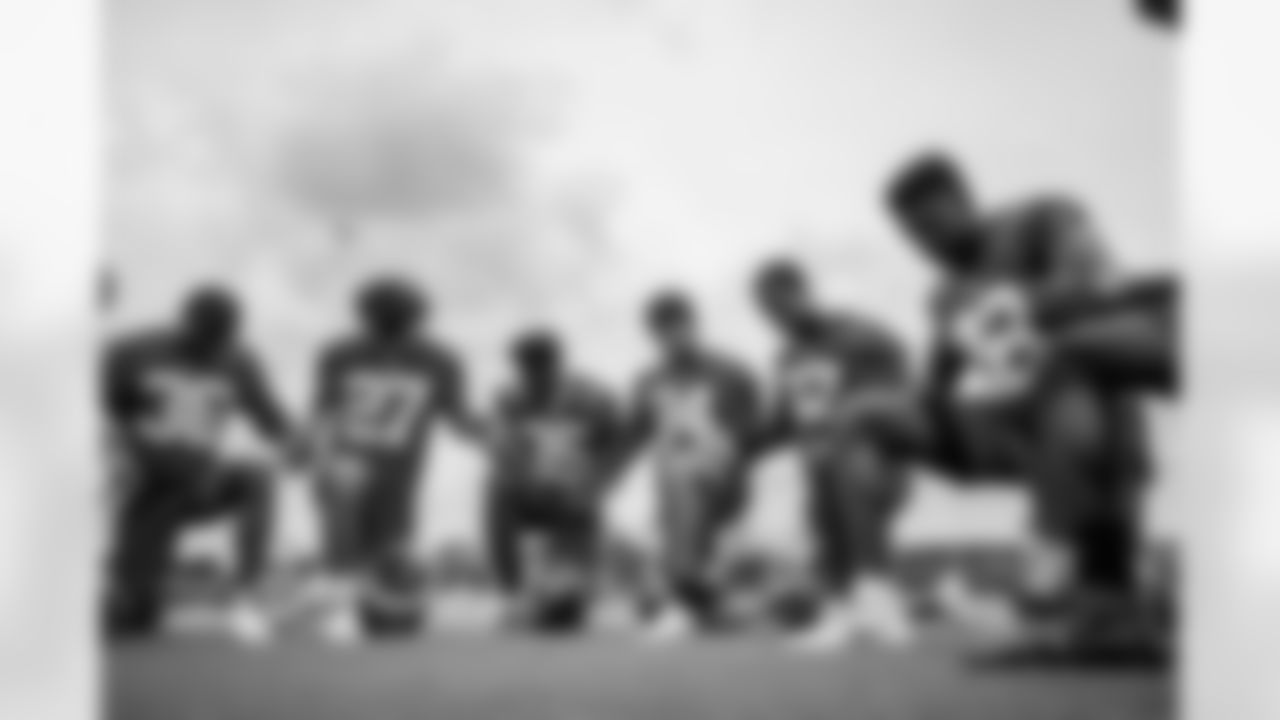
TAMPA, FL - May 25, 2022 - Cornerback Don Gardner #36, Cornerback Zyon McCollum #27, Cornerback Jamel Dean #35, Safety Nolan Turner #34, Cornerback Kyler McMichael #37, and Safety Keanu Neal #22 of the Tampa Bay Buccaneers during OTA's at AdventHealth Training Center. Photo By Kyle Zedaker/Tampa Bay Buccaneers
Muschamp, the man who believed in his ability, left to take a head coaching gig at South Carolina. Dean was never able to suit up for Muschamp and injury struck again. Prior to the 2016 season during fall camp, Dean tore his ACL in his left knee. After enduring yet another devastating setback, he sank into depression.
"I hit my breaking point," Dean described. "I basically just went into my dorm room and just sat in the dark and basically cried. Said, 'Man, maybe football is just not cut out for me?' I called my mom and said, 'Mom, I think I'm ready to quit.' But I had a good support system, and they did not allow it."
Initially, Dean shut down. He became a "shell" of himself and did not feel comfortable disclosing the way he felt. As he began to sift through the myriad of emotions, self-doubt and unrelenting circumstances, the harsh words he spoke to himself took a toll. The deprecating thoughts began to affect his mental state. He did not feel comfortable enough to become vulnerable to a therapist but knew he needed help. Once everything unraveled, Dean sought out advice in the form of family and teammates. His loved ones intervened and carried the weight of his burdens upon themselves so Dean did not have to face them alone.
"The mind is a powerful thing," Dean emphatically noted. "Sometimes, you can be unconscious of how you are behaving. You can be so stuck in a routine that you do not realize that you are ill. Just suppressing your feelings in your body, it only builds up like a time bomb, really. It waits until one instance when you are finally at your breaking point, and you reach the point of no return…my mom and my teammates at Auburn encouraged me. They said, 'You did not come this far just to give up.' I had to believe in myself and realize, if they believed so much in me, why couldn't I believe in myself like that?
"I had a guy that I went to school with, his name was Josh Holsey, and he was an inspiration for me because he tore both of his ACLs too and he had just come back from injury that year. I saw how he came out and made great plays and received a chance to get to the NFL. I thought, 'If he was able to do it, I just have to get my mindset right.' I took it upon myself to go through the whole rehab process that year and got myself back together."
Circumstances do not dictate character but reveal it. In the darkest days of isolation, Dean was able to fight depression despite his circumstances by investing in his mental health and seeking guidance from people in his circle he trusted. After suffering in silence, Dean made a courageous decision to become transparent, generating the strength he needed to begin rehabilitation. When most would have given up, he decided to wholeheartedly manifest his goals and dreams. Dean got himself healthy and went on to become a two-year starter for the Tigers. During his collegiate tenure from 2017-18, Dean accumulated 73 total tackles, one sack, two interceptions, 17 passes defensed and a fumble recovery in 26 game starts. His most notable performance came against Texas A&M, where he had seven tackles, a fumble recovery and a sack.
With a rare combination of size (6'1", 205 pounds) and speed (4.30 40-yard dash), Dean drew attention from evaluators. With ease in transition, Dean showcased his efficiency in quickly bursting out of breaks to match receivers on quick, intermediate routes for the Tigers. He was known for his prowess as a press coverage player, physicality at the line of scrimmage and ability to disrupt at the catch point. Dean entered the NFL draft after his redshirt junior year.
The Cocoa, Florida native fell under the radar due to question marks by teams regarding long-term damage with his knees that might hinder his career. At the scouting combine, he garnered the attention of media when he flashed his 4.3 40-yard dash, the best time among the defensive back group. He was lethal when utilized on corner blitzes for Auburn and became an ideal fit for the Buccaneers' attack-styled scheme. The Buccaneers were confident in Dean's health and selected him in the third round (94th overall pick) in the 2019 NFL Draft.
As he continued to develop during the acclimation process to the NFL including improved ball skills, Dean gradually made his way from a second-string cornerback to a full-time starter on the outside. The adversity he triumphed over throughout his life helped him gain an aspiring perspective in being able to move past and not stress on momentary mistakes early in his pro career. In the same way that Dean dedicates himself to film study of an opponent – focusing on the intricacies of a receiver's route combinations from the initial stem – he commits to prioritizing his mental health.
As a man who was once afraid to reveal his inner struggles to a therapist, he now advocates for attending therapy and routinely speaks with the team psychiatrist. After experiencing a perpetual cycle of adversity to the NFL's doorstep, Dean now encourages teammates and friends to expose mental struggles in order to heal, by coming to the realization that vulnerability is the most accurate measure of courage. He went through a winding journey to reach mental fortitude but can now appreciate the highs after experiencing the lows. From isolation to empowering others, Dean has come full circle.
He may have been a key figure in the Buccaneers' Super Bowl LV victory, but there was a moment when the dream of playing football seemed an elusive fantasy. Dean nearly called it quits and hung up his cleats; however, his mental transformation and the support of loved ones sparked an unwavering resilience.
The pain of the past was overshadowed by invigorated belief in himself and inspiring others to become catalysts for change in reversing the narrative on mental health. Now Dean helps mentor younger players by sharing experiences and advice for situations they will encounter. By relaying his struggles to other players that will navigate the same journey he walked through, Dean is striving to prevent them from hitting the breaking point he did six years prior. The more people disclose regarding mental health related topics, the less marginalized others will feel.
As Dean shifted in his chair under the illumination of lights in the room that embody his current mental fortitude, he shared a personal note to those struggling with mental illness or experiencing thoughts of suicide.
A letter from Jamel Dean:
"Find somebody that you can trust. Then, there will not be any judgement based off how you feel and then they can actually feel for you – a friend or a therapist. You are not crazy. You are not alone. You just need someone to talk to in order to let out all of the steam so you can be level-headed. With a clear mind, you might see the world differently after that conversation with a therapist. That is what they are there for. Being able to share helps you feel relieved that you are not holding that in anymore."
For additional information or to seek help, call the National Suicide Prevention Lifeline, 800-273-TALK or visit mhanational.org.












